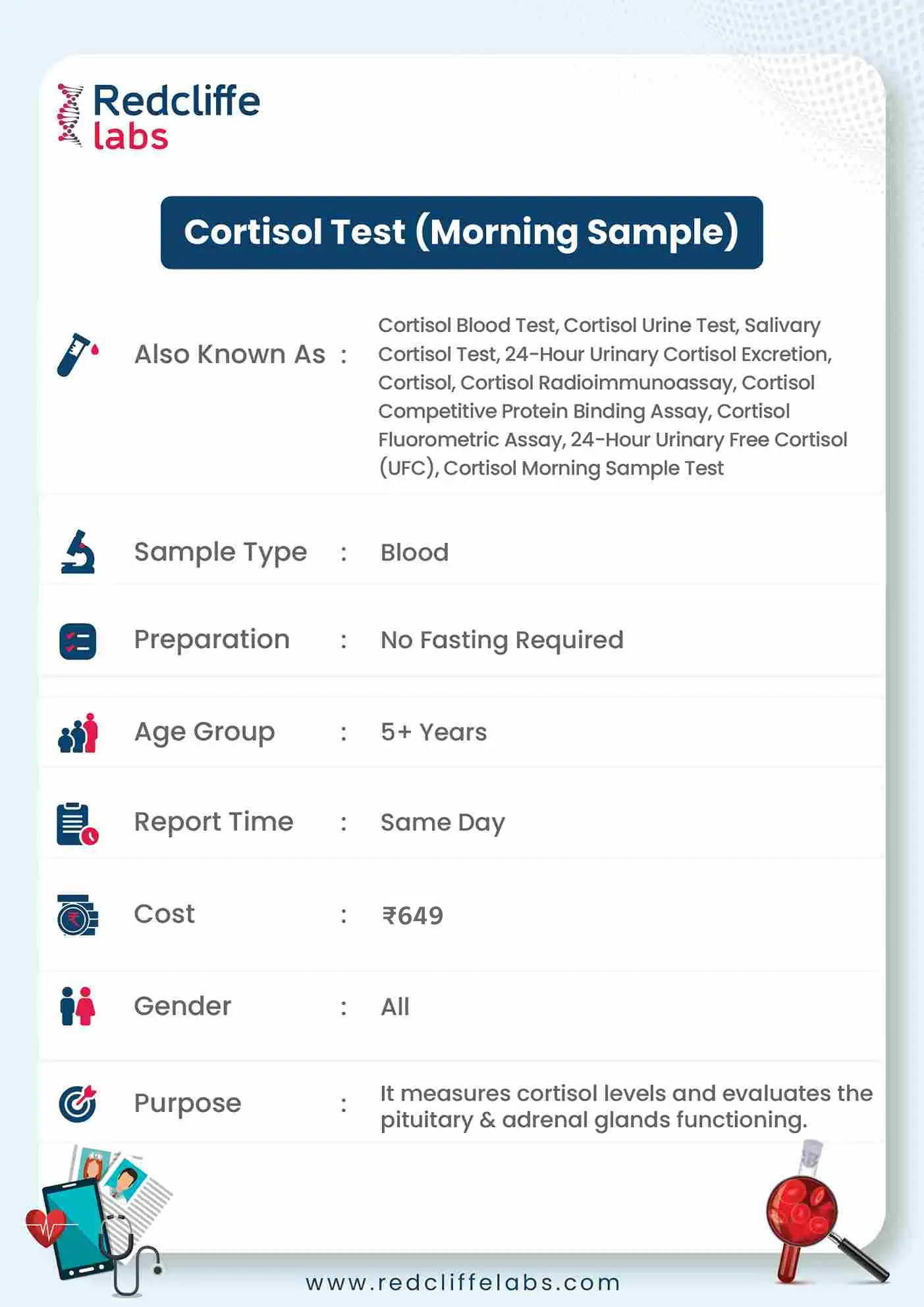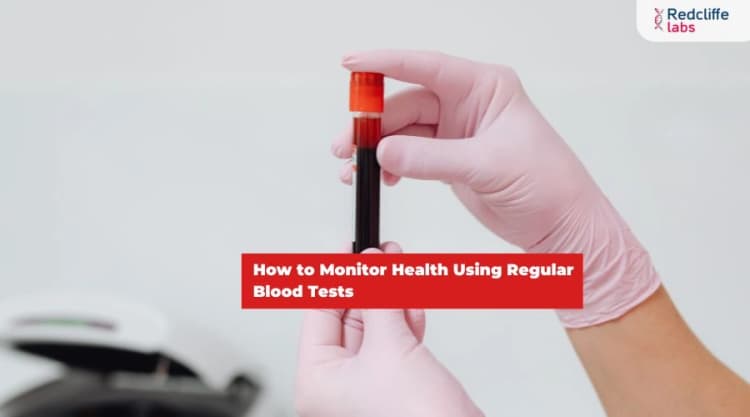This test measures serum cortisol, a hormone regulat...Read more
Blood
Unlock special
discount on
this package
Login to Unlock 🔓
test Instructions
NABL Accredited lab*

Booking Benefits Unlocked Worth FREE 799

Report Consultation

Diet Plan
*Available once your report is generated.
At Redcliffe Labs, we have a single goal: to give India its right to quality diagnostics.
Customers served
Tests Processed Everyday
Cities
Collection Centres
World Class In-house Labs
Home Collection Experts
1 Test Parameters
Cortisol, Morning Sample
1 PARAMETER INCLUDED
1 PARAMETER INCLUDED
- Cortisol
Top Booked Health Checkup Packages
Reports in 12 hours
|Parameters 94
Reports in 12 hours
|Parameters 89
Reports in 12 hours
|Parameters 96
Reports in 12 hours
|Parameters 96
Reports in 12 hours
|Parameters 90
Helps you know your test better
Q. What Is Cortisol Test?
Q. What Time Is Correct For Cortisol Levels Test?
Q. What Sample Is Required?
Q. What Are The Risks Involved With The Test?
Verified by Medical Expert

WRITTEN BY
Sheena Mehta

MEDICALLY REVIEWED BY
Dr. Pradeep Lodha
Table of Content
Introduction to Cortisol Morning Sample Test
The cortisol test measures the level of cortisol hormones in the blood. The cortisol is often called as
"Stress hormone" plays a crucial role in various body functions. In stressful situations, your body releases cortisol to increase energy levels, blood sugar, and alertness. This "fight-or-flight" response helps you deal with the stressor. It helps to regulate blood sugar by promoting the conversion of stored glucose into usable energy. It also influences metabolism, influencing how your body uses food for energy. It also helps to promote the conversion of stored glucose into usable energy. It also influences metabolism, influencing how your body uses food for energy. It also regulates blood pressure levels and reduces inflammation caused by injuries or illness.
Cortisol can be measured in a person's blood, urine, or saliva. Doctors may recommend a cortisol test to diagnose Cushing syndrome and Addison's diseases and evaluate pituitary gland problems. Your doctor may recommend the cortisol test if you are experiencing the symptoms of sudden weight loss, erectile dysfunction, unexplained growth of facial hair, high blood pressure, and more. Choose Redcliffe Labs as your trusted diagnostic partner to take the cortisol test. We ensure that we provide the best diagnostic services right from your home.
Test details in brief
| Also Known As | Cortisol Blood Test, Cortisol Urine Test, Salivary Cortisol Test, 24-Hour Urinary Cortisol Excretion, Cortisol, Cortisol Radioimmunoassay, Cortisol Competitive Protein Binding Assay, Cortisol Fluorometric Assay, 24-Hour Urinary Free Cortisol (UFC), Cortisol Morning Sample Test |
| Purpose | It measures cortisol levels and evaluates the pituitary & adrenal glands functioning. |
| Preparation | Do not take any over-the-counter medicine without confirming with your Doctor. |
| Fasting | No Fasting Required |
| Get Reports | Within 10-12 hrs |
| Cortisol Morning Sample Test Cost | INR ₹649 |

Purpose of the Cortisol test
The primary purpose of the cortisol test is to determine whether adrenal glands are producing an appropriate amount of hormone.
Diagnosing adrenal gland disorders- The test helps find the cause of the symptoms. Cortisol testing can help diagnose the cause of abnormal cortisol levels.
- Cushing syndrome- This condition arises when the cortisol levels in the body increase.
- Addison's disease- This condition occurs when your body doesn't produce enough cortisol.
- Evaluating pituitary gland problems- The pituitary gland controls cortisol production, and dysfunction can lead to abnormal cortisol levels.
Monitoring- If you take medication to manage cortisol levels, your doctor may advise the test to track the success of the treatment.
When should I get the cortisol test?
Your doctor might recommend a serum cortisol test if you're experiencing symptoms of adrenal gland issues or pituitary gland problems.
- Fatigue
- Muscle weakness
- Weight changes (unexplained gain or loss)
- Skin changes (thinning, easy bruising, stretch marks)
- Mood swings
- Sleep problems
- High blood pressure
- Low blood sugar
The doctor may recommend the test if you have health problems related to age, like hypertension and osteoporosis. While short-term stress impacts cortisol levels temporarily, chronic stress can lead to sustained changes that the test can identify. Studies suggest a link between low cortisol levels and depression, making the test valuable in some cases.
Cortisol imbalances can disrupt hormonal cycles, influencing fertility.
Preparation for the Cortisol test
The cortisol is a simple test that requires a blood/urine/saliva sample for testing. The cortisol level changes throughout the day, so your doctor may advise you to conduct the test at a specific time, depending on the purpose. The Cortisol Morning Sample Test will be done early in the morning as cortisol levels are highest.
- Fasting- The test takes 10-12 hours of fasting before the test.
- Medications- Inform your doctor about your medications, as the medications may impact your cortisol levels.
- Don’t stress- Try to avoid stressful situations before a cortisol test.
- Limit caffeine and alcohol consumption- Avoid consuming caffeine and alcohol for at least 10-12 hours before the test.
Ask your healthcare provider to ensure accurate test results if you have concerns about the cortisol test.
The procedure of the Cortisol Test
The sample collection can be done using blood, saliva, and urine.
- Cortisol blood test- The healthcare professional will locate a vein in your arm and collect the sample. After sample collection, they will apply a bandage over the puncture site.
- Saliva Test- The healthcare provider will collect the sample using swabs. They will insert the swab into your mouth or hold it under your tongue.
- Cortisol urine test- The healthcare provider will provide the container to collect the urine sample.
What do the cortisol test reports indicate?
The test results will be available within 15 hours of sample collection. The cortisol blood test measures the cortisol hormone level in the blood, urine, and saliva. The cortisol is a glucocorticoid hormone that controls blood sugar levels, manages stress, and regulates the immune system. The cortisol levels change over the day and react to various stressors. The test reports show the cortisol levels in the blood. Your doctor will review your test results, medical history, symptoms, and other potential influencing factors.
- Cortisol serum normal range- The normal cortisol level range may vary depending on the type of test, time of test, and laboratory performing the test. The normal range lies between 5 to 25 mcg/dL or 140 to 690 nmol/L.
- High Cortisol Level- Higher than the normal range, the cortisol level is considered high. This can indicate conditions like Cushing's syndrome, stress, certain medications, or tumors.
- Low cortisol levels- Lower than normal range cortisol levels are considered low. This indicates Addison's diseases, pituitary gland problems, or other illnesses.
Cortisol test reports will show the cortisol measured in the test sample and include reference ranges, which are the expected cortisol levels in healthy people. However, your circumstances must be considered when interpreting a cortisol test.
For some patients, a single cortisol test with results within the normal range is sufficient evidence that their body produces the correct amount of cortisol. Other patients may need multiple tests to determine if the amount of cortisol in their bodies is normal or abnormal.
Who should take the cortisol test?
There might be many reasons for taking cortisol tests; here are some-
- The people noticing symptoms like weight gain, easy bruising, stretch marks, muscle weakness, fatigue, high blood pressure, high blood sugar, mood swings, irregular periods, decreased sex drive, acne, facial hair growth, extreme fatigue, weight loss, loss of appetite, low blood pressure, skin darkening, depression, anxiety, salt cravings, digestive issues, joint pain, muscle aches, low blood sugar.
- For people who are taking medication for cortisol-related issues, the test can track the treatment's success.
- People are suffering from chronic stress or other underlying conditions causing fatigue, weight changes, mood swings, or sleep problems.
- Cortisol imbalances can disrupt hormonal cycles and influence fertility.
If you notice any of the above conditions, consult your doctor and take a Cortisol test. Consult your test reports with a medical professional; your doctor may advise the right treatment based on your medical history and specific symptoms.
What are the common symptoms related to abnormal cortisol levels?
Here are some common symptoms of abnormal cortisol levels-
Symptoms of High Cortisol Levels (Cushing's Syndrome)
- Weight gain
- Easy bruising and thin, fragile skin
- Muscle weakness and fatigue
- High blood pressure
- Stretch marks (striae) on the abdomen, thighs, and breasts
- High blood sugar (Hyperglycemia)
- Mood swings and irritability
- Irregular menstrual cycles in women
- Decreased sex drive in both men and women
- Acne and increased facial hair growth
Symptoms of Low Cortisol Levels (Addison's Disease)
- Extreme fatigue and weakness
- Weight loss
- Loss of appetite
- Low blood pressure
- Skin darkening(Hyperpigmentation)
- Depression and anxiety
- Salt cravings
- Stomach pain, nausea, and vomiting
- Joint pain and muscle aches
- Low blood sugar (Hypoglycemia)
Cortisol Test price at Redcliffe Labs
The Cortisol test price at Redcliffe Labs is INR 649. You can book your test online using the Redcliffe Labs app or the website. The prices are highly affordable and competitive to other labs. You can choose us as your trusted diagnostic partner to book your cortisol test. We offer a comprehensive range of diagnostic tests. You can book a free home sample collection for various tests. With our express delivery, you can collect your sample within 45 minutes.
Our labs are NABL-accredited and ISO-certified, ensuring quality and accuracy.

Cortisol Test Cost in Different Cities
| City Name | Discounted Price |
| Delhi | ₹649 |
| Mumbai | ₹649 |
| Bangalore | ₹649 |
| Kolkata | ₹649 |
| Noida | ₹649 |
| Pune | ₹649 |
| Lucknow | ₹649 |
| Ahmedabad | ₹649 |
| Hyderabad | ₹649 |
| Chennai | ₹649 |
| Gurgaon | ₹649 |
| Jaipur | ₹649 |
| Faridabad | ₹649 |
| Indore | ₹649 |
| Patna | ₹649 |
Understanding Your Stress Response: The Cortisol Test
The cortisol test is a blood, urine, or saliva test that measures the cortisol level, a hormone intimately linked to how your body copes with stress, regulates energy, and fights inflammation. It impacts your blood sugar, metabolism, immune system, and bone health. Whether high or low, imbalances can point to underlying medical conditions like Cushing's syndrome or Addison's disease. If you experience symptoms like unexplained weight gain, fatigue, muscle weakness, mood swings, or skin changes, your doctor might recommend a serum cortisol test. Also, consult your medical professional and take a serum cortisol test if you have concerns about chronic stress or suspicion. Early detection and treatment can significantly improve your quality of life and overall health. Discuss your concerns and symptoms with your doctor to see if the cortisol test is right for you.
5 Simple Steps to Manage Your Health with Redcliffe Labs
Quick, Simple & Convenient; trusted care delivered to your doorstep.

Start Your Online Booking
Open the Redcliffe Labs website/app. Select the test or package and enter your details. Schedule the service for your preferred slot.

Live Tracking
Stay updated with real-time tracking for a smooth and timely home sample collection.

Sample Collection
Our certified experts ensure a smooth, hygienic, and fully compliant sample collection experience.

Doctor-Verified Smart Reports
Every report is clinically checked by expert doctors and shared with smart, actionable insights.

Your Health Journey Continues Post Reports
Consult with our expert medical team to get actionable insights to improve your health.
Nearby Labs(9)
Redcliffe Labs Noida

MC-5280
Redcliffe Collection Center
Redcliffe Collection Center
Redcliffe Collection Center
Redcliffe Collection Center
Redcliffe Collection Center
Redcliffe Collection Center
Redcliffe Collection Center
Redcliffe Collection Center
Frequently Asked Questions
Why are my cortisol levels high in the morning?
Can stress cause high cortisol levels in the morning and low at night?
How can I naturally reduce my cortisol levels and stress?
What is the price of a Cortisol test?
How long does it take to bring high cortisol levels to normal?
Over time, what are the long-term effects of having low cortisol levels?
How does cortisol affect the body when too much is produced?
Can I book a Cortisol Morning Sample Test near me?
Can I book a home collection for a Cortisol Morning Sample Test?
Health Articles & Blogs
My Health
Stay informed with our expert health articles and blogs. Explore comprehensive guides on diseases, nutrition, preventive care, and wellness tips to help you make better health decisions.
Home Remedies to Get Rid of Cold in Babies: Safe & Natural Relief for Infants
Discover safe home remedies to get rid of cold in babies. Learn natural and gentle relief methods to ease cough, congestion, and cold symptoms in infants.

How Often Should You Get a Full Body Health Checkup?

Understanding BUN Test Normal Range & Results: High, Low & Normal
Understanding BUN test normal range and results helps evaluate kidney health. Learn what high, low, and normal BUN levels mean and when to get tested.

What Level of Lymphocytes Is Dangerous?

How to Monitor Health Using Regular Blood Tests?

টাইফয়েড কি বাহিত রোগ? – জানুন সবকিছু

What to Drink to Lose Belly Fat in 1 Week

Can Exercise Really Treat Depression? What Research Says
Discover what research says about exercise and depression. Learn how physical activity may improve mood, reduce symptoms, and support mental health.
Explore My Health
